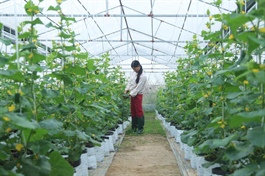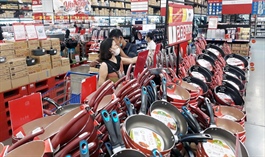VASEP asks for more loans for seafood enterprises
VASEP asks for more loans for seafood enterprises
The Vietnam Association of Seafood Exporters and Producers (VASEP) asked for capital support for seafood enterprises, which are set to make a 20-year high in export turnover this year.

In an official dispatch sent to Minister of Agriculture and Rural Development (MARD) Le Minh Hoan last week, VASEP said, despite difficulties in 2022, seafood exports have recovered and developed significantly, reaching a turnover of US$9.5 billion by the end of October, up 34 per cent over the same period last year.
It is expected to reach $10 billion by the end of November, a record milestone for Viet Nam's seafood industry after more than 20 years of participating in the world market. By the year's end, it is forecast to reach nearly $11 billion, up 25 per cent compared to 2021.
However, VASEP also mentioned that seafood businesses face several challenges that greatly impact their work, such as cutting and reducing credit limits for commercial banks.
According to VASEP, from mid-2022 until now and especially at present, many branches of commercial banks have sharply cut credit to seafood businesses even though the credit limit of many businesses was only 60 to 80 per cent of the loans disbursed.
The association said many large enterprises with large capital needs could not afford to purchase aquatic products and materials for production. As a result, some must operate in moderation, affecting the industry's growth and export, adding that some businesses have had to stop construction of their seafood production facilities.
VASEP also said if loans were difficult for large-scale enterprises to access, it was much more for small, medium and micro-sized enterprises, as their conditions to meet banks' requirements for capital disbursement, especially preferential capital sources, are even more tough.
In a meeting with the Prime Minister, Nguyen Hoai Nam, VASEP's deputy chairman, said 279 members of the association, which contributed more than 80 per cent of the total seafood export turnover of the country, were facing loan-access problems.
Nam said: "If there is no money to pay their old loans to commercial banks, businesses are not allowed to take out new loans."
It said with the production and export of seafood in 2022 having unexpectedly strong growth at the beginning of the year, it is difficult for enterprises to balance the increased demand for capital without credit sources from banks adjusted.
Thereby, VASEP proposed the Government and MARD consider and have solutions to increase the credit level for the industry in general.
In addition, it recommended that the State Bank of Viet Nam direct commercial banks to create conditions for seafood businesses to continue to access standard loans when seafood exports are on the way to recovery and growth now and in 2023.
At the same time, the Government should take supportive measures to stabilise the prices of inputs for aquaculture, especially the price of feed, aquaculture breeding stock, and the price of energy for exploitation, as well as adjust the US dollar exchange rate flexibly and appropriately, and reduce domestic logistics costs, urged the association.
Also in the official dispatch, VASEP stated that the current shortage of labourers working in factories is also a concern for the business community, which affects production schedules and delivery commitments and makes it difficult to increase capacity.
The association proposes the Government provide a land fund for enterprises to build houses for workers and increase social welfare in the urban industrial park.
The association said that it is necessary to have a legal framework for enterprises to use foreign labours in line with the situation of the industry.
According to the media, advantages created by free trade agreements (FTAs) have helped many local seafood enterprises turn challenges into opportunities. The sector is predicted to make up 3 per cent of the country's total overseas shipments this year.
According to VASEP, Viet Nam is currently the world's third largest exporter of fishery products, after China and Norway. With the obtained results, its seafood exports are expected to hold an over 7 per cent share in the global market.





















